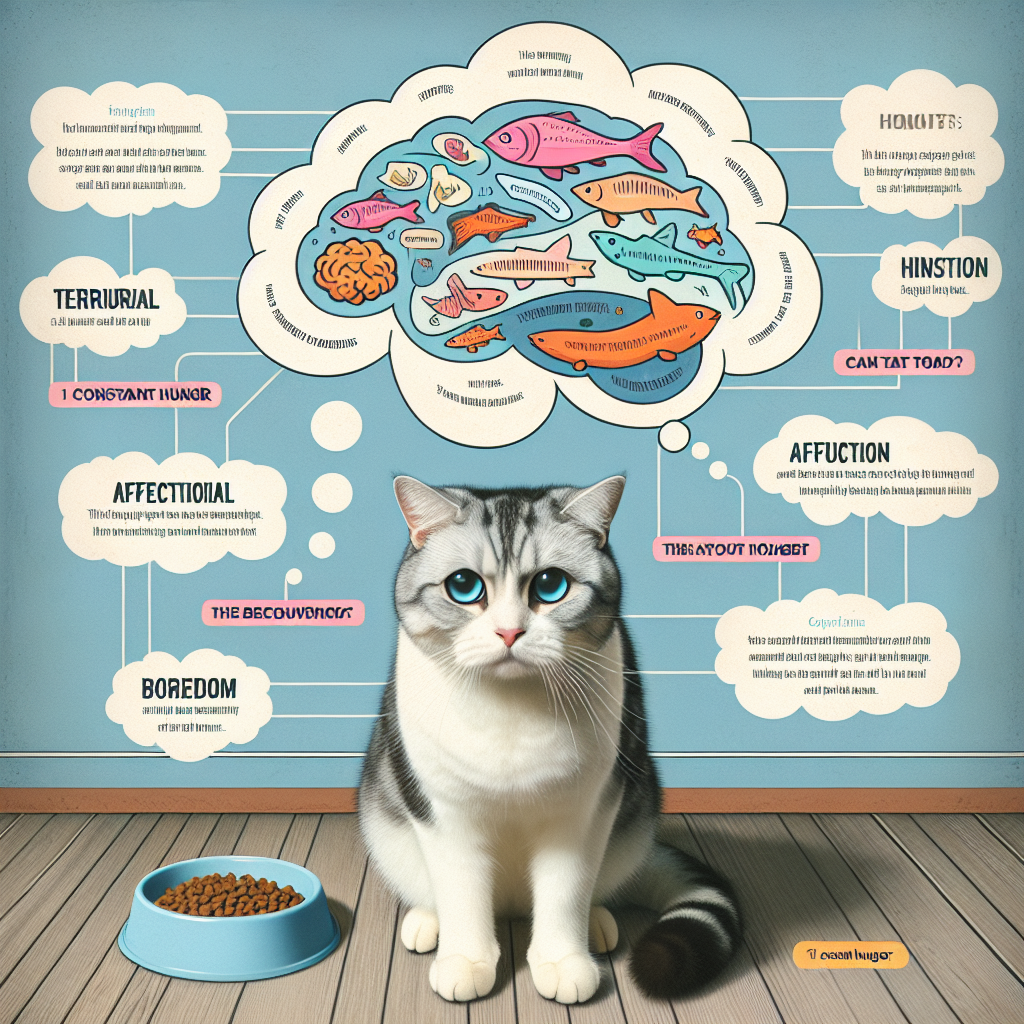===INTRO:===
If you’ve ever found yourself perplexed by your cat’s insatiable appetite, rest assured, you’re not alone. Many cat owners grapple with the mystery of their feline companions’ constant hunger. Understanding your cat’s constant hunger can alleviate your concerns and ensure your beloved pet’s health and happiness. This article delves into the underlying reasons that might explain your cat’s behavior and provides insights that can be transformative for both you and your furry friend.
Unraveling the Mystery: Why Is Your Cat Always Hungry?
To comprehend why your cat appears perpetually hungry, it’s essential to recognize that multiple factors play a role in this behavior. One of the most significant influences is your cat’s natural instincts. As descendants of hunters, cats are wired to seek food constantly, which can often result in begging for food even when they’re not truly hungry. This instinctual behavior is deeply ingrained, and understanding this can help you manage their feeding habits more effectively.
Moreover, the type of diet you provide can dramatically affect your cat’s perception of hunger. Cats thrive on a high-protein, low-carbohydrate diet, and feeding them low-quality, carbohydrate-heavy food can lead to energy crashes, prompting them to seem hungrier. If your cat is on a highly processed diet or consuming inadequate protein, this could explain their persistent desire for more food. Consider transitioning to a higher quality, species-appropriate diet to see if it alleviates their hunger.
Lastly, certain medical conditions may contribute to an increased appetite in cats. Diabetes, hyperthyroidism, and gastrointestinal issues can lead to unusual hunger patterns. If your cat’s eating habits have changed suddenly or are accompanied by other symptoms such as weight loss, lethargy, or diarrhea, it’s critical to consult your veterinarian for a thorough examination. Identifying any underlying health concerns is essential for your cat’s well-being and can prevent further complications.
Behavioral Factors Influencing Your Cat’s Eating Habits
Beyond biological instincts and diet, behavioral factors also play a crucial role in your cat’s eating habits. One prominent factor is boredom. Cats are creatures of habit, and without sufficient stimulation, they may turn to food as a source of entertainment. This tendency can be exacerbated if your cat is left alone for extended periods or lacks engaging toys and activities. Providing enriching environments with interactive toys and regular playtime can mitigate this behavior and lead to a healthier relationship with food.
Another behavioral consideration is stress or anxiety. Cats can experience heightened anxiety, leading to changes in eating habits. When feeling stressed, some cats may compensate by eating more, while others may eat less. Identifying stress triggers—such as changes in the household, new pets, or environmental disruptions—can help you manage their eating behavior effectively. Implementing calming techniques or creating safe spaces can significantly reduce anxiety-driven eating.
Additionally, feeding routines can influence your cat’s perception of hunger. Cats thrive on consistency, and erratic feeding schedules may lead them to beg for food more frequently. Establishing regular feeding times and portion control can create a sense of predictability that may reduce their anxiety about food availability. Moreover, incorporating puzzle feeders can make mealtime more engaging, providing mental stimulation that could deter constant begging.
===OUTRO:===
Deciphering your cat’s constant hunger can seem like a daunting task, but by understanding the myriad factors at play, you can adopt strategies to manage their dietary needs effectively. From the nuances of their instinctual behaviors to their environmental influences, each aspect offers a window into your cat’s world. By optimizing their diet, enhancing their surroundings, and addressing any potential health issues, you not only improve your cat’s quality of life but also foster a deeper bond between the two of you. If you’re concerned about your cat’s eating habits or overall health, never hesitate to consult your veterinarian. Taking informed action today can lead to a happier and healthier feline companion tomorrow.
Measuring Your Dog’s Height: A Comprehensive GuideUnderstanding How Dogs Become Infested with FleasUnderstanding the Lifespan of Pug Dogs: What to ExpectRelevant LinkRelevant LinkRelevant Link
